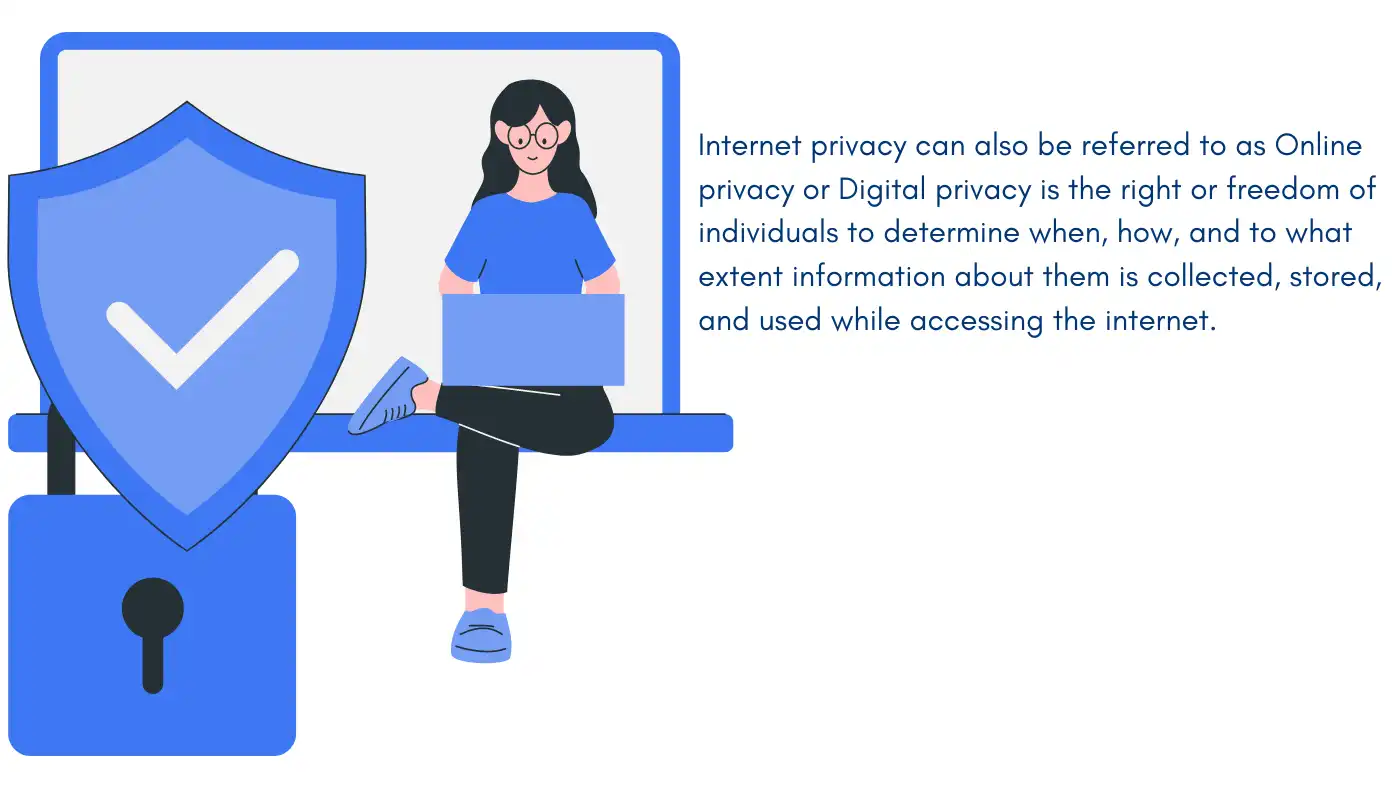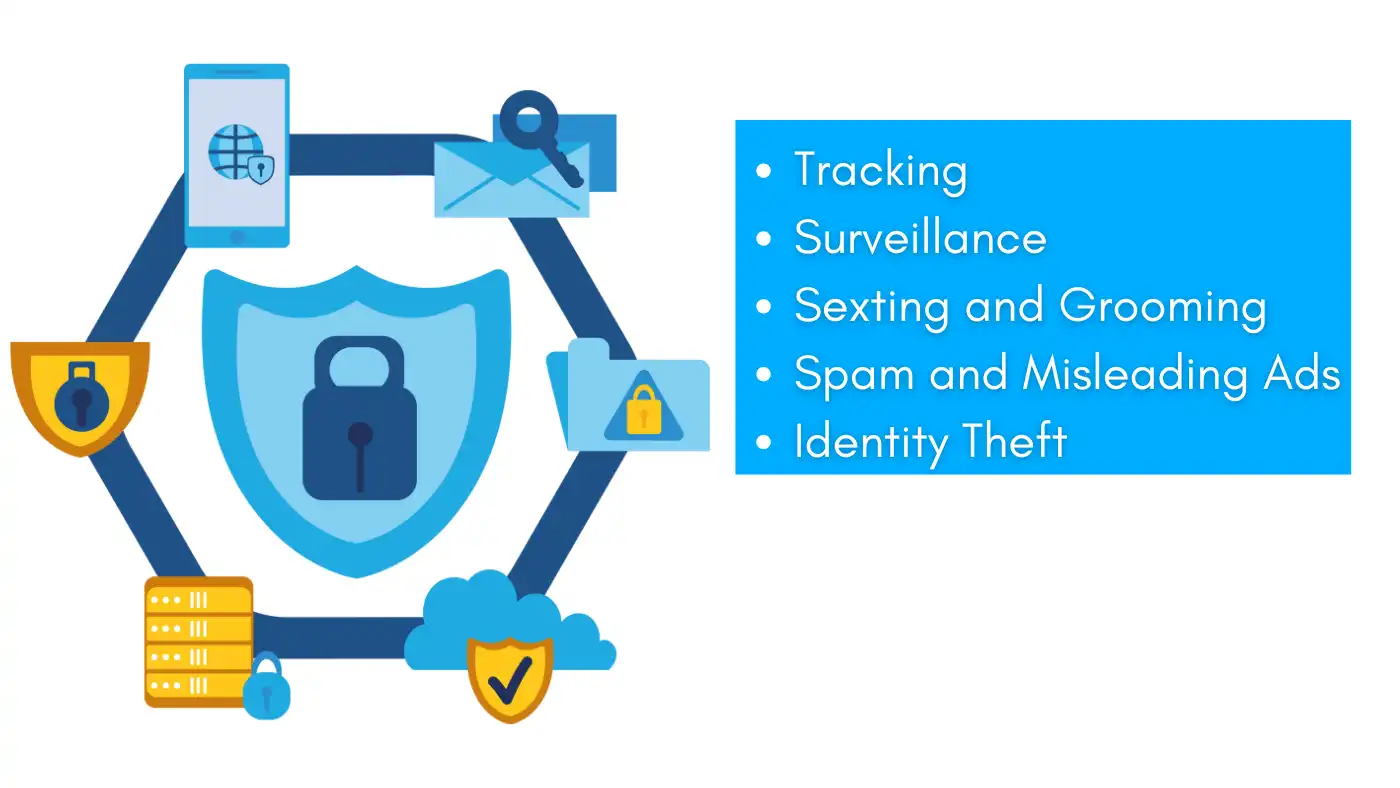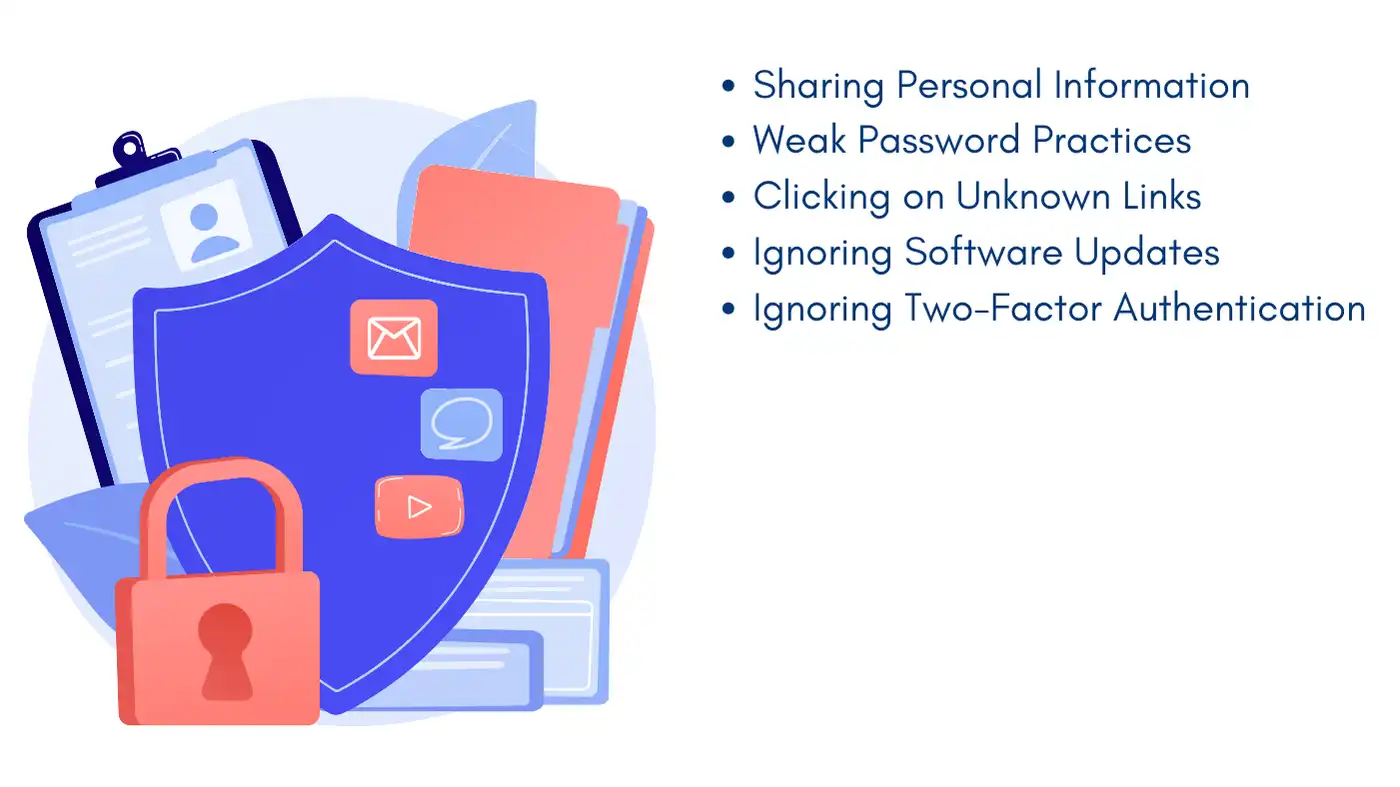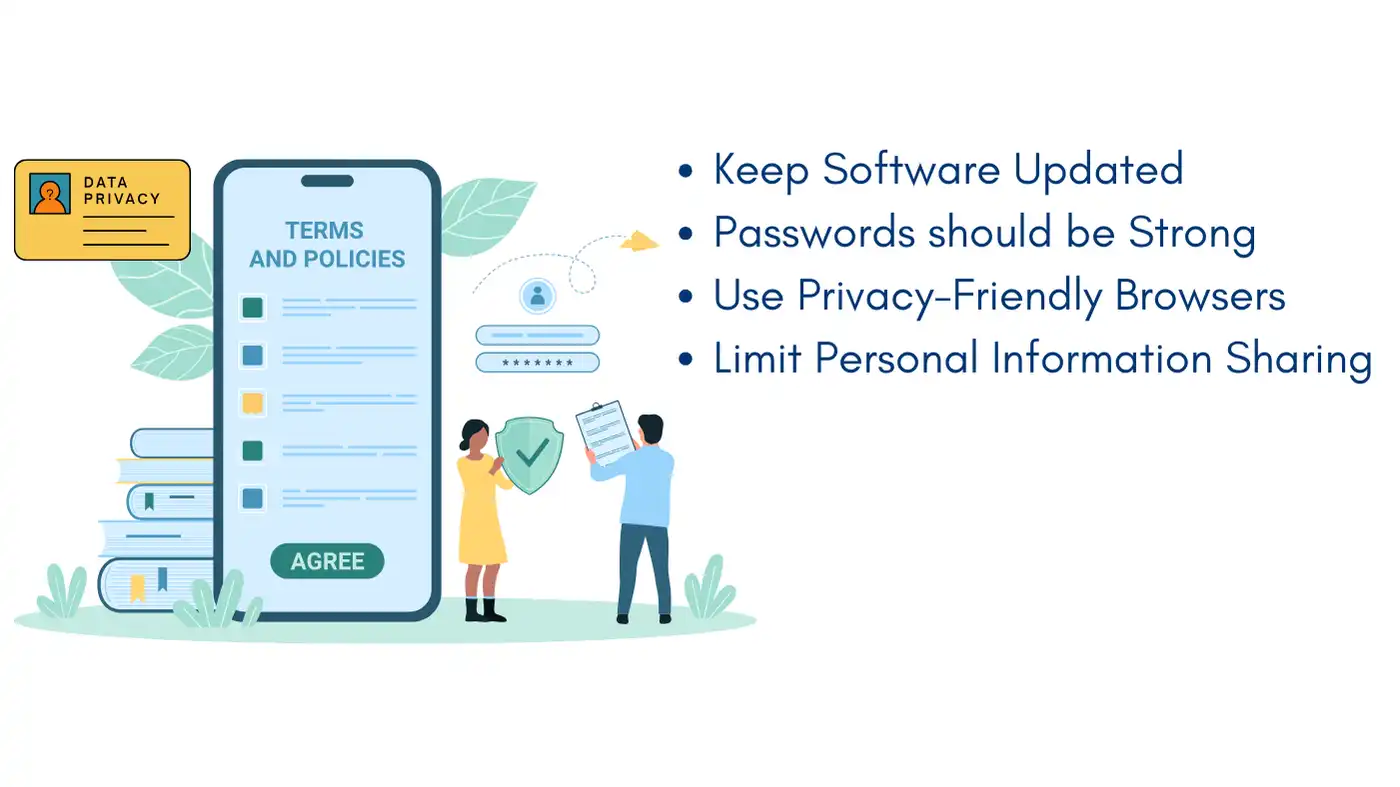In the modern world, concerns revolving around internet privacy issues are of paramount importance since most of the data being shared is in one way or another linked to the owner’s identity.
Everything we do online involves leaving a trail behind, a trail that is picked up by advertisers, marketers, and other students of our behavioral patterns – thus raising questions on surveillance, violation of privacy, unauthorized access, and other internet privacy issues.
All the above challenges raise real issues about our capacity to actively and consistently regain control of our information and right to privacy.
This is an important message in today’s rapidly advancing technological landscape where the strategies of those who wish to steal and monetize our information are continually adapting, underlining the necessity to increase privacy consciousness and apply proper defense mechanisms in the digital age.
What Is Internet Privacy?

Internet privacy, also referred to as online privacy or digital privacy, is the right or freedom of individuals to determine when.
How, and to what extent information about them is collected, stored, and used while accessing the internet.
With the growth of social networks and millions of people signing into the Internet every day, the issue of protecting personal information, and addressing online privacy concerns, is more significant than ever.
Internet privacy refers to the ability to maintain one’s privacy in terms of personally identifiable information, behaviors, and preferences from third-party interference including advertisers, hackers, among other parties, and even the government.
Therefore, the awareness and laws of internet privacy have become a paramount practice in the current society due to burgeoning cases of data loss, online privacy concerns, and exploitation.
The reasons why internet privacy is important are:
Internet privacy is a greatly valued commodity for various reasons.
In the first instance, it protects individuals’ personal and sensitive data from being accessed by would-be fraudsters such as hackers or cyber criminals.
Moreover, privacy and anonymity on the Internet are important for feelings of self-mastery and personal freedom as well as for the management of an individual’s public persona on the Internet.
Last, but not least, it can Be used to block specific advertisements and other invasive marketing approaches and reduce the danger of different forms of cyber persecution, including identity theft.
The Common Internet Privacy concerns

Internet privacy is a very typical issue in the present world particularly due to the increased uptake of information technology.
As consumers have more and more interactions over the Internet for purposes such as communication, shopping, socializing, and work, the amount of personal information disclosed has grown immensely.
This has resulted in different online privacy concerns that the users should appropriately understand to enhance the privacy of their information.
Here are some of the most common online privacy concerns:
1. Tracking
Tracking is one of the most common threats to protecting online privacy today, with most of the tracking occurring on the internet.
Most websites and advertisers engage in tracking users across the internet by using cookies and other related technologies.
This enables them to gather information on browsing habits, preferences, and demography and make dossiers for advertising.
As much as there are individuals who prefer being marketed to using target ads, many are associating tracking of their activities with consent.
Also, tracking can take place even if the users think that they are surfing incognito.
Most website owners place third-party scripts into their sites, which compile the subject’s histories across multiple sites, resulting in almost a complete picture of their activities.
However, this type of surveillance poses a massive threat to protecting online privacy because users are powerless and uninformed as to how and how much data is being collected from them.
2. Surveillance
This is another troubling factor of Internet privacy protection; government surveillance.
Different countries have their policies and standards that can regulate citizens’ activities on the internet with different pretexts including national security.
For example, the Invite Investigatory Powers Act of the UK empowers the government to conduct surveillance on Internet usage, and amongst other things, compels ISPs to provide data to the government.
It will also again create a culture of fear where people will decide to close from expressing themselves in matters they think are being monitored.
This problem is because a large number of users have no realization of the level of surveillance that may be exercised by the state structure and corporations, making internet privacy protection a critical concern.
3. Identity Theft
Phishing attacks are under the topic of internet privacy and security, where people’s identity is at risk of being stolen.
Some of the typical strategies include mail phishing, malicious software, and finally, computer break-ins where hackers aim at getting personal information like name, address, social security number, or even credit card details.
Tens of millions of Americans are known to be targeted by identity theft every year, and this results in the loss of money and credit.
Once criminals get hold of your parcels, they can use these details to create fake accounts, spend on the credits, or, commit other crimes in your stead.
The trauma that results from identity theft is unbearable and having our pockets drained financially by those who consider it a sport is an experience that many of us would not wish to go through.
4. Spam and Misleading Ads
Besides being an annoyance, spam and intrusive ads may raise serious internet privacy and security concerns.
Most spam messages include web links or attachments, the downloading of which deposits viruses on a user’s device.
These programs are dangerous because they can corrupt a person’s data, steal passwords, or take over the computer.
Also, it can present disguised as legitimate advertisements that compel the user to post their details or buy non-existent products and services.
Phishing is one of the most common attacks where criminals put up fake links and entice people to input their details, and therefore the users should be very careful when dealing with links and information over the internet.
5. Sexting and Grooming
The sort of behavior in which people transmit explicit messages or photographs through electronic devices is known as sexting, and it results in severe privacy invasion.
Once again, it means that it is very easy to forward the shared material without permission of the sender, which might cause embarrassment, harassment, or even the law to come after one.
Given the growing internet privacy issues, it is only apparent that one needs to be careful of what they post on the internet.
Also, it is witnessed that online predators will use methods of counseling to establish trust with a minor or a vulnerable individual.
Using this approach they can lead the victims into revealing personal details or encouraging them to perform wrong deeds.
These risks must be understood to ensure the safety of the young ones online by the parents and guardians.
6. Cyberbullying
Technological bullying is a trend that is a real problem nowadays in connection with the increased use of technologies, including teenagers and young people.
It entails the use of technological gadgets to threaten, intimidate, date, or harm anyone in society.
Cyberbullies may post mean messages, share a rumor, or post a photo without the consent of the individual concerned.
It should be noted that owing to the features of the internet, such as anonymity, the aggressors can attack the targets without a lot of consequences that may halt them.
Cyberbullying can hurt the feelings of the target and cause anxiety, depression, and in extremity a tragic end.
To overcome this problem one has to understand that responsibility lies with everyone starting from individuals going through schools and ending with communities needing to make the Internet A safer place.
Lastly, different internet privacy issues can be concluded as diverse and constantly developing in the context of the modern world.
This ranges from tracking other people’s activities to carrying out surveillance, to identity theft, and cyberbullying, among others; hence people have to be very careful with the things they do online and ensure that their identification details are guarded as much as possible.
Learning these typical privacy concerns and avoiding or mitigating these, which include using robust passwords, activating two-factor authentication, and avoiding sharing of delicate information, would help users to enhance their privacy in today’s complex world.
Thanks to increased awareness and education, people will be able to cope better with internet privacy issues, and thus the world will be safer for everyone.

- Lightning-fast speeds to browse without lag
- Servers in 105+ countries around the globe
- Military-grade security to stay safe online
- Try it risk-free with its money-back guarantee
- Native apps for all major devices
Behaviors That Have An Effect On Your Privacy On The Internet

1. Sharing Personal Information
Probably one of the most apparent ways people put their internet privacy issues at risk is through the use of social networks and other similar websites, where they share personal information regarding themselves.
This entails putting in details like full names, physical addresses, and phone contacts right to the most personal details such as financial details.
When given to third parties, this information can be used by other people such as advertisers and hackers.
2. Weak Password Practices
Having poor passwords, or passwords that are fairly easy to guess, is extremely dangerous to any online account.
Many users always use the same password for different sites causing the sites to be compromised.
Thus, potential risks may appear in other accounts if any of them have been subject to a breach.
To reduce this type of internet privacy issues, the use of strong and different passwords as well as the use of password managers is advisable.
3. Neglecting Privacy Settings
Among the most frequently used social networks and other online services, it is possible to adjust settings that define who may access the user’s data and how these data can be shared.
Most people rarely go through these settings to check or modify them and thus end up with open profiles, exposing data to other parties, which raises significant online privacy concerns.
4. Clicking on Unknown Links
Phishing is a trick where a person sends an e-mail or message that seems to be from a credible source but is fake, having links to a fake website.
Following these links may result in the installation of malicious codes and the loss of personal details.
This underscores the need to be careful with the sources of the links and ensure that the links are legitimate, as online privacy concerns are heightened when malicious links compromise personal data.
5. Ignoring Software Updates
Examples of such forms are software updates that contain features that counter threats that are well known.
Failure to update the software, application, and operating systems creates vulnerabilities in the gadgets and devices.
Updating software is one of the most basic actions that need to be taken to avoid possible risks on the internet.
6. Connect to Public Wi-Fi without any Security
When using such networks, data can easily be intercepted since such connections are often open hence being vulnerable to threats.
Sharing or receiving information that requires security, for example, account details or bank statements when connected to the public network puts you at risk of phishing.
The best way to avoid exposure on public networks is by using a Virtual Private Network (VPN) that encrypts the data hence enhancing privacy.
7. Failure to pay attention to Cookies and Tracking Technologies
Web users get tracked through cookies and other technologies to monitor their actions on the Web sites.
Some cookies can be functional which are crucial for the proper functioning of the site while others can be used for advertising purposes and for tracking users.
Users should be informed on cookies and if they do not want to be tracked they should consider changing their options.
8. Engaging In online Surveys and Quizzes
A majority of users fill out questions and polls containing personal data on the Internet.
Even though these might sound innocent they can serve as a means to obtain information for marketing in disguise.
Users should be careful when filling out the forms and be conscious of the possible consequences of sharing the information.
9. People Lack Knowledge of Data Sharing
Most internet-based enterprises compel their users to sign terms and conditions that contain conditions permitting the sharing of data.
It often leads to a situation where users have no clue as to what they are agreeing to, and they end up sharing information they wouldn’t wish to share.
It is wise for the users to avail their time by reading the privacy policies and the terms of service.
10. Sharing of passwords, Using Insecure Apps and Websites
The app and website creators also do not consider the user’s anonymity and safety as their top priority in most cases.
Interacting with applications that are insecure or originated from unverified sources puts personal data at risk.
App download should be done after due consideration while web connections should use the HTTPS protocol.
11. Ignoring Two-Factor Authentication (2FA)
Multi-factor authentication increases security since the user will be required to provide two different forms of identification apart from a password.
Failure to consider this factor poses more risks of unauthorized access.
It can be seen that enabling 2FA is one of the most straightforward yet effective methods of increasing one’s anonymity, especially on the internet.
12. Engaging in Oversharing
With social media being very active the privacy of individuals could be easily compromised due to sharing of information.
Most of the time, people broadcast their location, itineraries, and other details blindly; they don’t think about the dangers.
One could always be careful not to expose too much information to the public to avoid anyone hacking into that account.
It’s essential to think twice to share information on the internet while using public Wi-Fi, as this can prevent unwanted exposure.
The ability to comprehend and change such a behavior can greatly improve levels of online privacy.
As a result, individuals shall be careful about the data they reveal, use hard passwords, ensure their account privacy settings are properly set, and lastly be acquainted with the various threats associated with the digital world.
That’s why awareness and early actions are helpful to prevent the occurrence of the problem.
How To Protect Your Internet Privacy?

Internet security is known to be a major issue in the current world, hence making internet privacy protection crucial.
Due to the increased sharing of personal information on social sites as well as e-commerce, there is a heightened threat of privacy invasion through surveillance, data theft, and unauthorized use.
Here are several effective strategies to safeguard your internet privacy protection:
1. Limit Personal Information Sharing
A good way of protecting online privacy is also by controlling the kind of information that one posts on any online platform.
Whenever preparing to disclose any of your details, including name, address, phone number, or financial details, it is important to answer the question as to why this is necessary.
Most website and application users are asked to provide information that is not compulsory for the usage of the website or application.
Always keep in mind that there is a risk in providing your information, so it is advisable to look for other ways to provide other necessary information, like using different email and phone numbers for registering on some online platforms, thus protecting online privacy more effectively.
2. Use Privacy-Friendly Browsers
The findings also showed that it is important to select the appropriate web browser to enhance or reduce the chances of internet privacy and security invasion.
Go for such browsers as Mozilla Firefox or Brave since they perform actions like preventing the loading of trackers or offering better security features.
Furthermore, reset your browser to enable internet privacy and security and block any tracking from web website visits and it is also important to delete your browsing history and cookies frequently.
They should include non-tracking search engines such as DuckDuckGo which does not follow the user’s search history or any of the user’s information.
3. Passwords should be Strong and Two-factor authentication.
As such, it is important to ensure that one develops good passwords with high numbers of characters and alphanumeric combinations to guard one’s internet privacy protection when using online accounts.
Include both letters and numbers in both the upper and lower case as well as special characters.
Do not use easily guessable details, for example, birth dates or pets’ names.
One of the best ways to handle passwords is through the use of a password manager who generates long passwords that are difficult to guess and keeps them safe for use.
Also, use long and complex passwords, as well as the use of Two-Factor Authentication (2FA) in any place that it is offered.
This protects users from intruders, as often one is needed to produce a secret word along with a code that is usually received through your phone or by an authenticating application, enhancing internet privacy protection.
4. Keep Software Updated
It is recommended that you periodically update the operating system and the applications it supports to be secure.
This is usually done to close the ‘loopholes’ that hackers can take advantage of to penetrate the system.
Allow update installation on your software automatically if at all possible so ensure that all your software programs are updated to the most recent versions.
5. Set up antivirus software and firewalls
Having good antivirus software on your computer is a fundamental task to achieving privacy while surfing the net and addressing common internet privacy issues.
It means that antivirus software can scan for and eliminate all the threats that endanger your information.
Also, make sure that your device firewall is on to prevent unwanted access into the network, as these measures play a crucial role in preventing internet privacy issues.
6. Be very careful with Public Hotspots & Public Wi-Fi.
Open connection to the Internet is very much available today but one’s own desired device may pose a challenge to the owner especially when using it to access sensitive information.
Hackers love working with such networks as they provide them with the perfect chance to capture the information.
If one has to connect to these fake free Wi-Fi services, they need to connect through a VPN to enhance the security of the connection.
A VPN creates a secure channel for your data, so it becomes very difficult for anyone with ill intentions to get their hands on your data.
7. Checking the privacy settings that one has on social media.
Sites of SSM accumulate a great deal of personal data and their users interact with one another.
Remember to check the privacy settings from time to time and edit the level of access people have to your posts and info.
Make your profile private and only allow friends to view your profile and only accept friend requests from people you know.
Recent News Articles Related To Internet Privacy Issues:
Google to pay $85 Million to settle Arizona Privacy Lawsuit
Google has again been consuming a massive $85 million after it entered into a settlement with the state of Arizona in a case that accused the company of tracking the movement of Android device users without permission.
The case stated that Google’s location tracking practices were in the wrong against the Arizona Rizonaraud Act.
The settlement is Google’s latest of a series of litigations that the company has been involved in over the past years over how it carries out data collection.
New Regulation called EU Proposed to Protect AI User’s Privacy
New regulations for artificial intelligence systems in the European Union have been developed, and some of the blocks of these systems are prohibited from use as a threat to the individual.
Of the suggested rules are to ban the use of AI in the identification of individuals through facial recognition in public places.
The regulations are designed to promote the idea of ‘Respect AI‘ and help develop and apply AI in a manner that protects human rights including privacy.
The proposal has to be ratified by the European Parliament and the member states.
Split Apple Delay Child Safety Rollout Due to Privacy Controversy
Apple has put on hold plans for new features to monitor private content within its users’ iCloud for CSAM.
It included features that many people found as a privacy invasion and created a possibility of inducing abuse.
Apple explained that it needs more time to gather feedback for its service and improve the tools before releasing them to identify children in pictures.
This delay shows a discrepancy that is common with tech companies where protecting user’s privacy and other considerations are in question.
FTC Has Sued Kochava For Sale of Location Data That Can Be Used to Locate Individuals in Sensitive Areas
The U. S. Federal Trade Commission has sued data broker Kochava for selling geolocation data that is likely to be used in identifying people who visit such sensitive places as reproductive health clinics, worship places, homeless and domestic violence shelters, and addiction recovery centers.
Kochava broke the law by selling consumers’ details, something that the TC says puts people’s private lives up for sale and endangers vulnerable people.
They are seeking an injunction to stop Kochava from selling geolocation data that it regards as highly sensitive.

Uninterrupted, high-speed browsing, zero logs so your online activity is always private.
Over 7000 people checked out NordVPN in the last month
FAQs:
What does it mean to have privacy on the Internet?
Internet privacy can be defined as the right of individuals to manage the acquisition, usage as well as sharing of their information on the Internet. It encompasses how information is collected processed and disseminated through websites, applications, and other online services
Why is Internet privacy important?
Privacy of the internet in a way is beneficial to preserve people’s details from other people who intend to misuse the details for other bad purposes. It also enables people to keep control of their data, protect their image, and ensure their interactions are private.
What are the threats to internet privacy?
Some of the threats are data hacking/ Leaking, Advertising Companies tracking the users, Phishing scams, Unauthorized access to accounts, and Government/third-party surveillance.
What steps should one take to ensure internet privacy?
Some of the ways through which you can protect internet privacy include; using strong and unique passwords and two-factor authentication, setting privacy on different social accounts, avoiding releasing lots of personal information, using VPN, and updating the software frequently.
What is data breach all about?
A data breach is a situation whereby third parties gain access to unauthorized information including; personal details, statements, and other important accounts. Penetration of a firm’s system may cause leakage of clients’ personal information, which may in turn be used to defraud them.
What is the use of cookies for internet privacy?
Cookies are small pieces of data that are sent by websites, to monitor and recall information about users. As beneficial as they can be to providing a better user experience, they do raise questions and concerns for privacy since they can be used to track individuals’ activities on the internet without their knowledge.
Conclusion:
Thus, it can be stated that internet privacy issues remain one of the most pressing concerns in the age of digitalization.
In the context of people’s social media activity where more and more private information is shared, the classification of threats and protective actions are necessary.
First, for oneself, the protection of privacy ensures that one’s information is secure and one can regulate their interactions on social media platforms while for the rest it fosters a safer social network.






